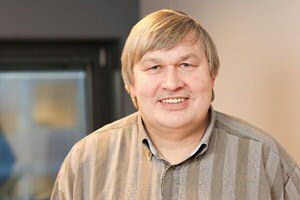Theoretical biologist Franjo Weissing to receive Distinguished Lorentz Fellowship

UG Professor in Theoretical Biology Franjo Weissing has been appointed the Distinguished Lorentz Fellow of the year 2017/18. As such, he will be in residence at the NIAS in Amsterdam for half a year to work on a project that connects the social and natural sciences. Weissing will focus on cultural evolution.
The Distinguished Lorentz Fellowship (DLF) is awarded annually to a researcher working at the interface of the social and natural sciences. The programme includes a five to ten-month stay at the Netherlands Institute for Advanced Study in the Humanities and Social Sciences (NIAS-KNAW). In addition, the recipient can organize a workshop at the Lorentz Center in Leiden and will receive a personal award of EUR 10,000.
Cultural evolution
Weissing says that he is very honoured. In his award-winning plan, he proposes to study the mechanisms of cultural evolution. ‘Some decades ago, British biologist Richard Dawkins suggested that cultural change is governed by similar principles as biological evolution. He coined the concept of a meme for a piece of cultural information and imagined that memes are spreading and competing with each other in the human population.’ A meme would thus be the cultural equivalent to the biological gene.' But Weissing has serious doubts about this concept. ‘It may be interesting to approach cultural processes, such as cultural segregation, from an evolutionary perspective. But the current models of cultural evolution are not very convincing. They are all mimicking biological evolution, while cultural information emerges and spreads in a very different way than genetic information.’
During his time as Lorentz Fellow, he wants to initiate the development of new theory that is based on the mechanisms underlying the emergence and transmission of cultural ideas. ‘We will have to start from scratch, since the current theory is still in its infant stages.’ Weissing is convinced that a theory of cultural evolution can only be successful if it reflects close interdisciplinary collaboration: ‘It will, for example, require contributions from developmental psychology: how do we actually learn from others? and from the social sciences: which factors determine the spread of ideas within and across cultures?’
Workshop
During the workshop at the end of the programme, Weissing will bring together both critics and proponents of the idea of cultural evolution. He hopes that the workshop will produce a roadmap for the research on cultural evolution in the next decade. Weissing is looking forward to his half year at the NIAS: ‘I teach a lot, and I enjoy it; but I also look forward to exclusively devoting my time to research for a while. Besides cultural evolution, there are many other questions about evolution that I would like to address.’
The NIAS-Lorentz Programme is a collaboration between the NIAS and the Lorentz Center . It is supported by the Royal Netherlands Academy of Arts and Sciences (KNAW) and the Netherlands Organisation for Scientific Research (NWO).
More information
-
Franjo Weissing
More news
-
17 February 2026
The long search for new physics
-
10 February 2026
Why only a small number of planets are suitable for life
